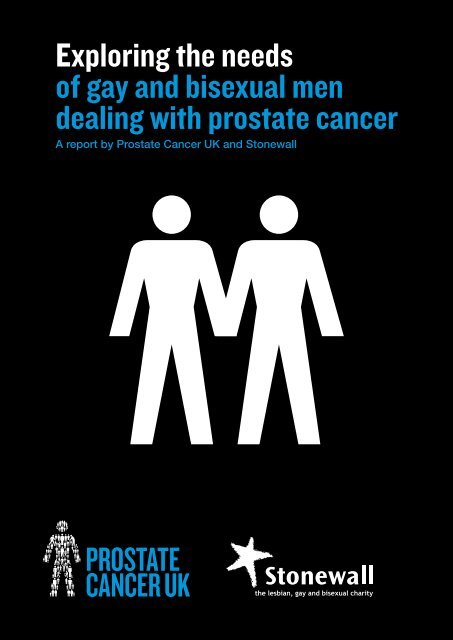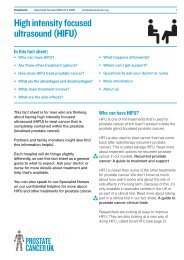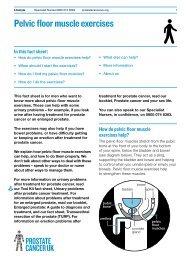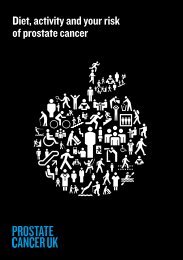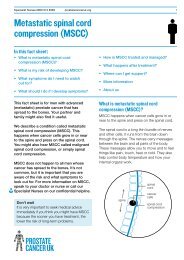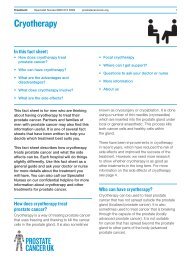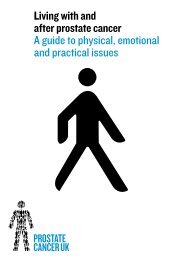Exploring the needs of gay and bisexual men dealing with prostate ...
Exploring the needs of gay and bisexual men dealing with prostate ...
Exploring the needs of gay and bisexual men dealing with prostate ...
You also want an ePaper? Increase the reach of your titles
YUMPU automatically turns print PDFs into web optimized ePapers that Google loves.
<strong>Exploring</strong> <strong>the</strong> <strong>needs</strong><br />
<strong>of</strong> <strong>gay</strong> <strong>and</strong> <strong>bisexual</strong> <strong>men</strong><br />
<strong>dealing</strong> <strong>with</strong> <strong>prostate</strong> cancer<br />
A report by Prostate Cancer UK <strong>and</strong> Stonewall
Contents<br />
Executive summary 3<br />
Introduction 4<br />
An overview <strong>of</strong> <strong>gay</strong> <strong>and</strong> <strong>bisexual</strong> <strong>men</strong>’s health in Britain 6<br />
Current research about <strong>gay</strong> <strong>and</strong> <strong>bisexual</strong> <strong>men</strong> <strong>and</strong><br />
<strong>prostate</strong> cancer 8<br />
Workshop findings 12<br />
Findings from discussions 15<br />
Recom<strong>men</strong>dations 19<br />
More information 21<br />
References 22<br />
<strong>Exploring</strong> <strong>the</strong> <strong>needs</strong> <strong>of</strong> <strong>gay</strong> <strong>and</strong> <strong>bisexual</strong> <strong>men</strong> <strong>dealing</strong> <strong>with</strong> <strong>prostate</strong> cancer 2
Executive summary<br />
Prostate cancer is <strong>the</strong> most common cancer in <strong>men</strong> in <strong>the</strong> United Kingdom, yet <strong>the</strong>re is a<br />
lack <strong>of</strong> research <strong>and</strong> knowledge about <strong>the</strong> <strong>needs</strong> <strong>and</strong> experiences <strong>of</strong> <strong>gay</strong> <strong>and</strong> <strong>bisexual</strong> <strong>men</strong><br />
<strong>with</strong> <strong>prostate</strong> cancer, <strong>and</strong> currently no specific services for this group <strong>of</strong> <strong>men</strong>. With this in<br />
mind Prostate Cancer UK <strong>and</strong> Stonewall held a one-day workshop to explore <strong>the</strong>se issues,<br />
bringing toge<strong>the</strong>r health pr<strong>of</strong>essionals, researchers, experts <strong>and</strong> <strong>gay</strong> <strong>men</strong> affected by <strong>prostate</strong><br />
cancer. Presentations <strong>and</strong> discussions on <strong>the</strong> day considered <strong>the</strong> gaps in information,<br />
support <strong>and</strong> health pr<strong>of</strong>essional knowledge.<br />
Recom<strong>men</strong>dations from <strong>the</strong> workshop include taking immediate steps such as using more<br />
diverse imagery on <strong>the</strong> Prostate Cancer UK website, <strong>and</strong> in leaflets <strong>and</strong> booklets, as well as<br />
formation <strong>of</strong> an internal equality <strong>and</strong> diversity <strong>and</strong> working group. Longer term goals include<br />
developing links between o<strong>the</strong>r cancer organisations <strong>and</strong> <strong>gay</strong> <strong>and</strong> <strong>bisexual</strong> organisations to<br />
share knowledge <strong>and</strong> good practice; developing resources for support groups <strong>and</strong> assisting<br />
<strong>gay</strong> <strong>and</strong> <strong>bisexual</strong> <strong>men</strong> who wish to set up <strong>the</strong>ir own groups, considering fur<strong>the</strong>r training for<br />
health pr<strong>of</strong>essionals <strong>and</strong> developing a specific information resource for <strong>gay</strong> <strong>and</strong> <strong>bisexual</strong> <strong>men</strong>.<br />
Prostate Cancer UK <strong>and</strong> Stonewall will look for ways to work toge<strong>the</strong>r to imple<strong>men</strong>t<br />
<strong>the</strong>se recom<strong>men</strong>dations.<br />
<strong>Exploring</strong> <strong>the</strong> <strong>needs</strong> <strong>of</strong> <strong>gay</strong> <strong>and</strong> <strong>bisexual</strong> <strong>men</strong> <strong>dealing</strong> <strong>with</strong> <strong>prostate</strong> cancer 3
Introduction<br />
Prostate cancer is <strong>the</strong> most common cancer in <strong>men</strong> in <strong>the</strong> United Kingdom: 1 in 8 <strong>men</strong> will<br />
get <strong>prostate</strong> cancer at some point in <strong>the</strong>ir lives <strong>and</strong> 250,000 <strong>men</strong> are living <strong>with</strong> <strong>the</strong> disease.<br />
It is predicted to become <strong>the</strong> most prevalent <strong>of</strong> all cancers in <strong>the</strong> UK by 2030. (1) Prostate<br />
cancer can be treated, but most treat<strong>men</strong>ts come <strong>with</strong> side effects such as incontinence,<br />
sexual problems <strong>and</strong> fatigue. Diagnosis <strong>and</strong> treat<strong>men</strong>t not only have a physical effect but also<br />
a psychological <strong>and</strong> social impact, challenging <strong>men</strong>’s identities, daily life <strong>and</strong> relationships.<br />
Prostate Cancer UK fights to help more <strong>men</strong> survive <strong>prostate</strong> cancer <strong>and</strong> enjoy a better<br />
quality <strong>of</strong> life. We want <strong>the</strong> best diagnosis, treat<strong>men</strong>t <strong>and</strong> support for all <strong>men</strong> <strong>with</strong> <strong>prostate</strong><br />
cancer <strong>and</strong> o<strong>the</strong>r <strong>prostate</strong> diseases, <strong>and</strong> to cure or to prolong life <strong>with</strong>out unwanted sideeffects.<br />
We support <strong>men</strong> living <strong>with</strong> <strong>prostate</strong> cancer <strong>and</strong> <strong>prostate</strong> disease, <strong>and</strong> <strong>the</strong> effects<br />
<strong>of</strong> treat<strong>men</strong>t, by providing specialist information <strong>and</strong> support services. We find answers<br />
by funding research into <strong>the</strong> causes <strong>and</strong> treat<strong>men</strong>t <strong>of</strong> all <strong>prostate</strong> disease. We lead change<br />
by campaigning, creating conversations <strong>and</strong> co-operating <strong>with</strong> o<strong>the</strong>rs.<br />
<strong>Exploring</strong> <strong>the</strong> <strong>needs</strong> <strong>of</strong> <strong>gay</strong> <strong>and</strong> <strong>bisexual</strong> <strong>men</strong> <strong>dealing</strong> <strong>with</strong> <strong>prostate</strong> cancer 4
Prostate Cancer UK fights for all <strong>men</strong> <strong>with</strong> <strong>prostate</strong> cancer, <strong>and</strong> we want to make sure we are<br />
inclusive <strong>of</strong> <strong>the</strong> 5-7% or more <strong>men</strong> in <strong>the</strong> United Kingdom who are <strong>gay</strong> <strong>and</strong> <strong>bisexual</strong>.<br />
We have worked <strong>with</strong> Stonewall, <strong>the</strong> UK’s leading lesbian, <strong>gay</strong> <strong>and</strong> <strong>bisexual</strong> equality charity,<br />
to produce this report. The report provides an overview <strong>of</strong> <strong>gay</strong> <strong>and</strong> <strong>bisexual</strong> <strong>men</strong>’s health in<br />
Britain, summarises <strong>the</strong> existing research <strong>and</strong> covers key findings <strong>and</strong> recom<strong>men</strong>dations<br />
following a one day workshop exploring <strong>the</strong>se issues. Prostate Cancer UK is committed<br />
to taking <strong>the</strong> necessary steps to address <strong>the</strong> <strong>needs</strong> <strong>of</strong> <strong>gay</strong> <strong>and</strong> <strong>bisexual</strong> <strong>men</strong> affected by<br />
<strong>prostate</strong> cancer.<br />
<strong>Exploring</strong> <strong>the</strong> <strong>needs</strong> <strong>of</strong> <strong>gay</strong> <strong>and</strong> <strong>bisexual</strong> <strong>men</strong> <strong>dealing</strong> <strong>with</strong> <strong>prostate</strong> cancer 5
An overview <strong>of</strong> <strong>gay</strong> <strong>and</strong><br />
<strong>bisexual</strong> <strong>men</strong>’s health in Britain<br />
James Taylor, Senior Health Officer, Stonewall<br />
With 6,861 respondents from across Britain, Stonewall’s Gay <strong>and</strong> Bisexual Men’s Health Survey<br />
(2012) is <strong>the</strong> largest survey ever conducted <strong>of</strong> <strong>gay</strong> <strong>and</strong> <strong>bisexual</strong> <strong>men</strong>’s health <strong>needs</strong> in <strong>the</strong><br />
world. However, it demonstrates that many <strong>of</strong> <strong>the</strong>se <strong>needs</strong> are not being met <strong>and</strong> that <strong>the</strong>re are<br />
significant areas <strong>of</strong> concern – most particularly in <strong>men</strong>tal health <strong>and</strong> drug use – that have been<br />
overlooked by health services, which too <strong>of</strong>ten focus solely on <strong>gay</strong> <strong>men</strong>’s sexual health. The<br />
report provides hard evidence that <strong>gay</strong> <strong>and</strong> <strong>bisexual</strong> <strong>men</strong> feel neglected by a health system that<br />
has a duty to treat everyone equally, having an impact on whe<strong>the</strong>r <strong>the</strong>y take advice on health<br />
issues or access monitoring <strong>and</strong> testing services.<br />
“More information should be available about general health <strong>and</strong> well-being <strong>and</strong> not just<br />
about sexual health.”<br />
George, 56, Yorkshire <strong>and</strong> <strong>the</strong> Humber<br />
• In <strong>the</strong> last year, three per cent <strong>of</strong> <strong>gay</strong> <strong>men</strong> <strong>and</strong> five per cent <strong>of</strong> <strong>bisexual</strong> <strong>men</strong> have<br />
attempted to take <strong>the</strong>ir own life. Just 0.4 per cent <strong>of</strong> <strong>men</strong> in general attempted to take<br />
<strong>the</strong>ir own life in <strong>the</strong> same period.<br />
• One in sixteen (six per cent) <strong>gay</strong> <strong>and</strong> <strong>bisexual</strong> <strong>men</strong> aged 16 to 24 have attempted to take<br />
<strong>the</strong>ir own life in <strong>the</strong> last year. Less than one per cent <strong>of</strong> <strong>men</strong> in general aged 16 to 24 have<br />
attempted to take <strong>the</strong>ir own life in <strong>the</strong> same period.<br />
• Almost half <strong>of</strong> <strong>gay</strong> <strong>and</strong> <strong>bisexual</strong> <strong>men</strong> worry about <strong>the</strong> way <strong>the</strong>y look <strong>and</strong> wish <strong>the</strong>y<br />
could think about it less.<br />
• One in five <strong>gay</strong> <strong>and</strong> <strong>bisexual</strong> <strong>men</strong> have had problems <strong>with</strong> <strong>the</strong>ir weight or eating<br />
at some time.<br />
• Half <strong>of</strong> <strong>gay</strong> <strong>and</strong> <strong>bisexual</strong> <strong>men</strong> have experienced at least one incident <strong>of</strong> domestic<br />
abuse from a family member or partner since <strong>the</strong> age <strong>of</strong> 16 compared to 17 per cent<br />
<strong>of</strong> <strong>men</strong> in general.<br />
• More than a third <strong>of</strong> <strong>gay</strong> <strong>and</strong> <strong>bisexual</strong> <strong>men</strong> have experienced at least one incident <strong>of</strong><br />
domestic abuse in a relationship <strong>with</strong> a man.<br />
• Just one in ten (10 per cent) <strong>gay</strong> <strong>and</strong> <strong>bisexual</strong> <strong>men</strong> have ever discussed <strong>prostate</strong><br />
cancer <strong>with</strong> a healthcare pr<strong>of</strong>essional.<br />
<strong>Exploring</strong> <strong>the</strong> <strong>needs</strong> <strong>of</strong> <strong>gay</strong> <strong>and</strong> <strong>bisexual</strong> <strong>men</strong> <strong>dealing</strong> <strong>with</strong> <strong>prostate</strong> cancer 6
• One in four <strong>gay</strong> <strong>and</strong> <strong>bisexual</strong> <strong>men</strong> have never been tested for any sexually<br />
transmitted infection.<br />
• Three in ten <strong>gay</strong> <strong>and</strong> <strong>bisexual</strong> <strong>men</strong> have never had an HIV test in spite <strong>of</strong> early<br />
diagnosis now being a public health priority.<br />
• A third <strong>of</strong> <strong>gay</strong> <strong>and</strong> <strong>bisexual</strong> <strong>men</strong> who have accessed healthcare services in <strong>the</strong> last<br />
year have had a negative experience related to <strong>the</strong>ir sexual orientation.<br />
• More than a quarter <strong>of</strong> <strong>gay</strong> <strong>and</strong> <strong>bisexual</strong> <strong>men</strong> said <strong>the</strong>ir healthcare pr<strong>of</strong>essional<br />
acknowledged <strong>the</strong>y were <strong>gay</strong> or <strong>bisexual</strong> after <strong>the</strong>y had come out <strong>and</strong> just one in eight<br />
were told that <strong>the</strong>ir partner was welcome to be present during a consultation.<br />
“My partner is terminally ill <strong>with</strong> cancer. Even though he has asked for his treat<strong>men</strong>t to be<br />
talked over <strong>with</strong> me <strong>and</strong> to call me before his family, <strong>the</strong>y have <strong>of</strong>ten not done so.”<br />
Eddie, 56, North West London<br />
• Only a quarter <strong>of</strong> <strong>gay</strong> <strong>and</strong> <strong>bisexual</strong> <strong>men</strong> said that healthcare workers had given <strong>the</strong>m<br />
information relevant to <strong>the</strong>ir sexual orientation.<br />
Lesbian, Gay <strong>and</strong> Bisexual People in Later Life (Stonewall, 2011), conducted by YouGov,<br />
surveyed over 1,000 older lesbian, <strong>gay</strong> <strong>and</strong> <strong>bisexual</strong> people highlighting particular issues<br />
for older <strong>gay</strong> <strong>and</strong> <strong>bisexual</strong> <strong>men</strong>:<br />
• Nine per cent <strong>of</strong> lesbian, <strong>gay</strong> <strong>and</strong> <strong>bisexual</strong> people over <strong>the</strong> age <strong>of</strong> 55 have taken illegal<br />
drugs in <strong>the</strong> last year.<br />
• 35 per cent <strong>of</strong> <strong>gay</strong> <strong>men</strong> over <strong>the</strong> age <strong>of</strong> 55 drink alcoholic drinks ei<strong>the</strong>r everyday or at least<br />
five to six days per week.<br />
• Five per cent <strong>of</strong> <strong>gay</strong> <strong>and</strong> <strong>bisexual</strong> <strong>men</strong> over <strong>the</strong> age <strong>of</strong> 55 have been diagnosed <strong>with</strong><br />
depression in <strong>the</strong> last year.<br />
• 29 per cent <strong>of</strong> <strong>gay</strong> <strong>and</strong> <strong>bisexual</strong> <strong>men</strong> over <strong>the</strong> age <strong>of</strong> 55 have been diagnosed <strong>with</strong> anxiety.<br />
Stonewall research is available at:<br />
stonewall.org.uk/publications<br />
<strong>Exploring</strong> <strong>the</strong> <strong>needs</strong> <strong>of</strong> <strong>gay</strong> <strong>and</strong> <strong>bisexual</strong> <strong>men</strong> <strong>dealing</strong> <strong>with</strong> <strong>prostate</strong> cancer 7
Current research about <strong>gay</strong><br />
<strong>and</strong> <strong>bisexual</strong> <strong>men</strong> <strong>and</strong> <strong>prostate</strong> cancer<br />
Anneliese Levy, Senior Information Develop<strong>men</strong>t Officer, Prostate Cancer UK<br />
The main body <strong>of</strong> research into <strong>prostate</strong> cancer has tended to focus on <strong>the</strong> experiences <strong>of</strong><br />
heterosexual <strong>men</strong>. Where research has been conducted that includes <strong>the</strong> experiences <strong>and</strong><br />
outcomes <strong>of</strong> <strong>gay</strong> <strong>and</strong> <strong>bisexual</strong> <strong>men</strong> living <strong>with</strong> <strong>prostate</strong> cancer, it has been fairly small in scale.<br />
It is clear that <strong>the</strong>re is a need for more detailed research.<br />
Incidence <strong>and</strong> awareness <strong>of</strong> <strong>prostate</strong> cancer<br />
At <strong>the</strong> mo<strong>men</strong>t <strong>the</strong>re is little information relating to rates <strong>of</strong> cancer by sexual orientation in <strong>the</strong><br />
UK. The All Party Parlia<strong>men</strong>tary Group on Cancer’s Inquiry into Inequalities in Cancer (2009)<br />
reported that <strong>gay</strong> <strong>men</strong> have a higher incidence <strong>of</strong> anal cancer <strong>and</strong> cancers related to HIV/<br />
AIDS; (2) but any differences in <strong>the</strong> incidence <strong>of</strong> <strong>prostate</strong> cancer in <strong>gay</strong> <strong>and</strong> <strong>bisexual</strong> <strong>men</strong> from<br />
<strong>the</strong> general population is not known.<br />
A mixed picture <strong>of</strong> levels <strong>of</strong> cancer awareness exists. In terms <strong>of</strong> general cancer awareness,<br />
a survey commissioned by <strong>the</strong> Depart<strong>men</strong>t <strong>of</strong> Health reported that <strong>gay</strong> <strong>and</strong> <strong>bisexual</strong> people,<br />
particularly <strong>men</strong>, tended to be slightly more aware <strong>of</strong> cancer issues (signs, symptoms <strong>and</strong><br />
risk factors) <strong>and</strong> anticipated seeking medical help more quickly than heterosexuals. (3) Yet, as<br />
previously discussed, Stonewall’s survey <strong>of</strong> <strong>gay</strong> <strong>and</strong> <strong>bisexual</strong> <strong>men</strong>’s health <strong>needs</strong>, found that<br />
only one in ten (10 per cent) <strong>gay</strong> <strong>and</strong> <strong>bisexual</strong> <strong>men</strong> have ever discussed <strong>prostate</strong> cancer <strong>with</strong><br />
a healthcare pr<strong>of</strong>essional. More than two thirds (68 per cent) <strong>of</strong> <strong>gay</strong> <strong>and</strong> <strong>bisexual</strong> <strong>men</strong> aged<br />
over 50 have not had a discussion. This is a slighter lower rate <strong>of</strong> awareness than amongst<br />
<strong>men</strong> in general. (4)<br />
Living <strong>with</strong> <strong>prostate</strong> cancer<br />
Over <strong>the</strong> past thirty years research has shed light on <strong>the</strong> pr<strong>of</strong>ound psychological <strong>and</strong> social<br />
effects <strong>of</strong> living <strong>with</strong> <strong>prostate</strong> cancer. (5) However nearly all <strong>of</strong> this research has been in<br />
(6) (7)<br />
heterosexual <strong>men</strong>.<br />
Prostate cancer is likely to affect <strong>gay</strong> <strong>men</strong> in many <strong>of</strong> <strong>the</strong> same ways as heterosexual <strong>men</strong>,<br />
but <strong>the</strong>re may also be some different concerns <strong>and</strong> impacts. (8) (6) Indeed, two recent studies<br />
have shown that <strong>gay</strong> <strong>men</strong> had lower levels <strong>of</strong> functioning than heterosexual <strong>men</strong> after<br />
(9) (10)<br />
<strong>prostate</strong> surgery <strong>and</strong> during hormone <strong>the</strong>rapy treat<strong>men</strong>t.<br />
There may be specific historical, social <strong>and</strong> cultural context for <strong>gay</strong> <strong>men</strong> <strong>with</strong> <strong>prostate</strong> cancer.<br />
In one study a <strong>gay</strong> man worried that his weight loss after surgery might be perceived <strong>with</strong>in<br />
<strong>the</strong> <strong>gay</strong> community as HIV/AIDS related. (11) In <strong>the</strong> same research <strong>gay</strong> <strong>men</strong> <strong>with</strong> cancer<br />
<strong>Exploring</strong> <strong>the</strong> <strong>needs</strong> <strong>of</strong> <strong>gay</strong> <strong>and</strong> <strong>bisexual</strong> <strong>men</strong> <strong>dealing</strong> <strong>with</strong> <strong>prostate</strong> cancer 8
acknowledged an interaction <strong>with</strong> <strong>the</strong> effect <strong>of</strong> cancer on <strong>the</strong> body <strong>and</strong> <strong>the</strong> importance<br />
placed on physical appearance for some <strong>gay</strong> <strong>and</strong> <strong>bisexual</strong> <strong>men</strong>. One single <strong>gay</strong> man said:<br />
“It has a lot to do <strong>with</strong> body image. It’s a very sexually charged community <strong>and</strong> I think that<br />
<strong>dealing</strong> <strong>with</strong> your new shape, your new form, wondering how people are going to perceive<br />
that… The body image thing grew – where you become more conscious <strong>of</strong> how you look<br />
<strong>and</strong> how you present to o<strong>the</strong>rs.” (11)<br />
Sexual issues<br />
Treat<strong>men</strong>ts for <strong>prostate</strong> cancer can cause sexual side effects such as problems <strong>with</strong> erections<br />
<strong>and</strong> loss <strong>of</strong> sex drive. Specific issues for <strong>gay</strong> <strong>men</strong> may not be addressed in st<strong>and</strong>ard advice<br />
<strong>and</strong> information. During anal sex, <strong>the</strong> <strong>prostate</strong> gl<strong>and</strong> can be an area <strong>of</strong> sexual pleasure, <strong>and</strong> it<br />
is argued that <strong>prostate</strong> cancer <strong>the</strong>refore, carries a particular significance to <strong>gay</strong> <strong>men</strong> <strong>and</strong> <strong>the</strong>ir<br />
sense <strong>of</strong> sexuality. (12)<br />
Assumptions made during sexual rehabilitation after <strong>prostate</strong> cancer treat<strong>men</strong>t may need<br />
challenging. For example rehabilitation is <strong>of</strong>ten focused on creating erections rigid enough<br />
(13) (14)<br />
for vaginal penetration when anal penetration may require a greater degree <strong>of</strong> rigidity.<br />
Different advice <strong>and</strong> treat<strong>men</strong>t may be needed for <strong>gay</strong> <strong>men</strong> who do have anal sex.<br />
Radio<strong>the</strong>rapy to <strong>the</strong> <strong>prostate</strong> <strong>and</strong> <strong>the</strong> surrounding area can cause bowel problems such<br />
as diarrhoea, pain in <strong>the</strong> back passage, or, more rarely, bleeding from <strong>the</strong> back passage.<br />
Gay <strong>men</strong> who receive anal sex, need to be made aware in a sensitive way <strong>of</strong> <strong>the</strong>se side<br />
(6) (15)<br />
effects, not only after treat<strong>men</strong>t, but before treat<strong>men</strong>t during decision-making.<br />
“I had a request from a <strong>gay</strong> man about anal penetration recently. He asked if we could<br />
make it known that after radio<strong>the</strong>rapy, rectal pain <strong>and</strong> sensitive internal ‘skin’ means that<br />
lots <strong>of</strong> <strong>gay</strong> <strong>men</strong> worry about engaging in anal sex but don’t know who to ask. Could it be<br />
in some publication My advice would be to use a condom for sure, <strong>and</strong> lots <strong>of</strong> lubrication<br />
once <strong>the</strong> acute side effects have settled.”<br />
A psychosexual <strong>the</strong>rapist<br />
Sex <strong>and</strong> relationships<br />
Much <strong>of</strong> <strong>the</strong> research around erectile dysfunction assumes that <strong>men</strong> are in long-term,<br />
monogamous relationships <strong>and</strong> doesn’t address issues that single <strong>men</strong> may experience.<br />
Stonewall’s research shows that older <strong>gay</strong> <strong>men</strong> are more likely to be single than older<br />
heterosexual people.<br />
“It seems to me that current views on sorting out sexual activity <strong>with</strong> <strong>prostate</strong> cancer<br />
generally seem to be concerned <strong>with</strong> ‘working things through <strong>with</strong> a partner,’ which as a<br />
recently single <strong>gay</strong> man does not apply to me. It seems now to me that finding a partner is<br />
going to be more difficult.”<br />
A <strong>gay</strong> man <strong>with</strong> <strong>prostate</strong> cancer<br />
<strong>Exploring</strong> <strong>the</strong> <strong>needs</strong> <strong>of</strong> <strong>gay</strong> <strong>and</strong> <strong>bisexual</strong> <strong>men</strong> <strong>dealing</strong> <strong>with</strong> <strong>prostate</strong> cancer 9
Patterns <strong>of</strong> sexual behavior in <strong>gay</strong>/<strong>bisexual</strong> <strong>men</strong> may be different to heterosexual <strong>men</strong>. (16)<br />
Single <strong>gay</strong> <strong>and</strong> <strong>bisexual</strong> <strong>men</strong> face challenges <strong>and</strong> worries around explaining <strong>the</strong>ir loss <strong>of</strong><br />
erection or libido to a new partner <strong>with</strong> whom <strong>the</strong>y don’t have established trust. (17)<br />
“I found loss <strong>of</strong> libido really difficult – it was just totally ‘switched <strong>of</strong>f.’ On <strong>the</strong> <strong>gay</strong> scene this<br />
is really difficult – size matters <strong>and</strong> you show you like someone <strong>with</strong> your erection.”<br />
A <strong>gay</strong> man <strong>with</strong> <strong>prostate</strong> cancer.<br />
Support<br />
Prostate cancer mainly affects <strong>men</strong> over <strong>the</strong> age <strong>of</strong> 50 <strong>and</strong> risk increases <strong>with</strong> age. Gay <strong>men</strong><br />
<strong>with</strong> <strong>prostate</strong> may have social support, but this support may be different from heterosexual<br />
<strong>men</strong>. For example, older <strong>gay</strong> <strong>and</strong> <strong>bisexual</strong> people are more likely to live alone <strong>and</strong> less likely<br />
to have children. (18)<br />
Additionally, <strong>gay</strong> <strong>and</strong> <strong>bisexual</strong> <strong>men</strong> may be excluded from non-family support enjoyed by<br />
heterosexual <strong>men</strong>, such as support groups. (8) (11) Currently <strong>the</strong>re are no specific face-to-face<br />
support groups for <strong>gay</strong> <strong>men</strong> <strong>with</strong> <strong>prostate</strong> cancer in <strong>the</strong> UK. Although some <strong>gay</strong> <strong>men</strong> may<br />
try to find a support group open to having <strong>gay</strong> <strong>men</strong> participate, o<strong>the</strong>rs may remain closeted,<br />
rely on internet-based support groups, or be socially isolated. (13) Support groups need to <strong>of</strong>fer<br />
a space for <strong>gay</strong> <strong>men</strong> to discuss problems openly.<br />
For <strong>gay</strong> <strong>men</strong> who are in long term relationships, <strong>the</strong>re is very little research about male-to-male<br />
support <strong>and</strong> if <strong>and</strong> how this differs from female partner support in long-term relationships. (6)<br />
Experiences <strong>of</strong> healthcare<br />
It is important for health pr<strong>of</strong>essionals working in oncology to consider patients’ sexual<br />
orientation, as <strong>the</strong>re may be separate or different issues for <strong>gay</strong> <strong>men</strong> affected by <strong>prostate</strong><br />
cancer. (15) However, many <strong>gay</strong> <strong>men</strong> report that healthcare providers fail to ask about sexual<br />
orientation during initial consultations <strong>and</strong> assume <strong>the</strong>y are heterosexual. (19) (12) Limited research<br />
suggests than <strong>men</strong> <strong>with</strong> <strong>prostate</strong> cancer may not disclose <strong>the</strong>ir sexuality to health care<br />
pr<strong>of</strong>essionals because <strong>the</strong>y are worried about negative reactions; (12) or that when <strong>the</strong>y do<br />
let <strong>the</strong>m know <strong>the</strong>y are <strong>gay</strong>, this may <strong>the</strong>n be ignored. (11) More generally, in <strong>the</strong> latest Cancer<br />
Patient Experience Survey respondents who described <strong>the</strong>mselves as non-heterosexual had<br />
less positive experiences <strong>of</strong> many aspects <strong>of</strong> treat<strong>men</strong>t, care <strong>and</strong> information <strong>with</strong>in <strong>the</strong><br />
NHS. These negative experiences were mainly related to issues <strong>with</strong> communication,<br />
respect <strong>and</strong> dignity. (20) Stonewall’s Gay <strong>and</strong> Bisexual Men’s Health Survey highlights<br />
that a third <strong>of</strong> <strong>gay</strong> <strong>and</strong> <strong>bisexual</strong> <strong>men</strong> who have accessed healthcare in <strong>the</strong> last year<br />
have had a negative experience in relation to <strong>the</strong>ir sexual orientation.<br />
As <strong>gay</strong> <strong>men</strong> <strong>with</strong> <strong>prostate</strong> cancer are typically older, <strong>the</strong>y may have more concerns about<br />
disclosing <strong>the</strong>ir sexuality to healthcare providers than younger <strong>gay</strong> <strong>men</strong> who may feel more<br />
comfortable being open about <strong>the</strong>ir sexuality. (19) Older <strong>gay</strong> <strong>men</strong> might also be less likely than<br />
younger <strong>gay</strong> <strong>men</strong> to insist on including partners in consultations. (13)<br />
<strong>Exploring</strong> <strong>the</strong> <strong>needs</strong> <strong>of</strong> <strong>gay</strong> <strong>and</strong> <strong>bisexual</strong> <strong>men</strong> <strong>dealing</strong> <strong>with</strong> <strong>prostate</strong> cancer 10
Health pr<strong>of</strong>essional education<br />
As <strong>the</strong>re is little attention in research or practice on <strong>dealing</strong> <strong>with</strong> <strong>prostate</strong> cancer in <strong>gay</strong> or<br />
<strong>bisexual</strong> <strong>men</strong>, health pr<strong>of</strong>essionals may lack knowledge <strong>of</strong> potential differences in physical or<br />
psychological experiences. (6) Some oncology nurses believe that <strong>the</strong>y will not be able to <strong>of</strong>fer<br />
specific advice <strong>and</strong> support to <strong>gay</strong> <strong>and</strong> <strong>bisexual</strong> <strong>men</strong> because <strong>the</strong>y feel that <strong>the</strong>y do not know<br />
enough about <strong>the</strong>ir lives, cultures or sexual practices. (21)<br />
Case study: Shine a light programme,<br />
Prostate Cancer Foundation <strong>of</strong> Australia (PCFA)<br />
Better <strong>prostate</strong> cancer support for <strong>the</strong> <strong>gay</strong> community.<br />
PCFA has been working <strong>with</strong> <strong>the</strong> <strong>gay</strong> <strong>and</strong> <strong>bisexual</strong> community to identify <strong>and</strong> close <strong>the</strong><br />
gap in resources <strong>and</strong> support for <strong>gay</strong> <strong>and</strong> <strong>bisexual</strong> <strong>men</strong>. They established a working<br />
group involving activists, clinicians, Cancer Councils, academics <strong>and</strong> o<strong>the</strong>rs who<br />
are interested in this area. As well as working closely <strong>with</strong> Malecare, a <strong>men</strong>’s cancer<br />
advocacy organisation based in New York (see page 21).They used an evidence<br />
based approach <strong>and</strong> conducted workshops in Sydney <strong>and</strong> Melbourne to underst<strong>and</strong><br />
<strong>men</strong>’s support <strong>needs</strong>. These workshops led to <strong>the</strong> establish<strong>men</strong>t <strong>of</strong> a Shine a Light<br />
support group in each city. In addition, <strong>with</strong> Cancer Council Victoria, an audit <strong>of</strong> existing<br />
resources <strong>and</strong> websites was conducted by. It showed, as expected, that non-heterosexual<br />
<strong>men</strong> are almost invisible in print <strong>and</strong> online information, including (unfortunately)<br />
PCFA’s resources. The second phase <strong>of</strong> work is to build an action plan to address <strong>the</strong><br />
issues that have been identified.<br />
<strong>prostate</strong>.org.au<br />
<strong>Exploring</strong> <strong>the</strong> <strong>needs</strong> <strong>of</strong> <strong>gay</strong> <strong>and</strong> <strong>bisexual</strong> <strong>men</strong> <strong>dealing</strong> <strong>with</strong> <strong>prostate</strong> cancer 11
Workshop findings<br />
With <strong>the</strong> lack <strong>of</strong> research <strong>and</strong> knowledge in mind, Prostate Cancer UK <strong>and</strong> Stonewall<br />
organised a one day workshop on Friday 21 September 2012 at <strong>the</strong> Wellcome Collection<br />
in London. The event brought toge<strong>the</strong>r health pr<strong>of</strong>essionals, researchers <strong>and</strong> expert<br />
organisations in <strong>gay</strong> <strong>and</strong> <strong>bisexual</strong> <strong>men</strong>’s health; <strong>and</strong> some <strong>gay</strong> <strong>men</strong> affected by <strong>prostate</strong><br />
cancer to discuss <strong>the</strong> issues <strong>and</strong> decide on some next steps. It was <strong>the</strong> first event <strong>of</strong> its kind<br />
in <strong>the</strong> United Kingdom specifically exploring <strong>the</strong> potential <strong>needs</strong> <strong>of</strong> <strong>gay</strong> <strong>and</strong> <strong>bisexual</strong> <strong>men</strong><br />
<strong>dealing</strong> <strong>with</strong> <strong>prostate</strong> cancer.<br />
Through presentations on research <strong>and</strong> existing practice, <strong>and</strong> group discussion, attendees<br />
explored <strong>the</strong> potential issues <strong>and</strong> differences in experiences <strong>and</strong> <strong>needs</strong> in this group <strong>of</strong> <strong>men</strong>,<br />
as well as considering next steps in addressing <strong>the</strong>se <strong>needs</strong>.<br />
<strong>Exploring</strong> <strong>the</strong> <strong>needs</strong> <strong>of</strong> <strong>gay</strong> <strong>and</strong> <strong>bisexual</strong> <strong>men</strong> <strong>dealing</strong> <strong>with</strong> <strong>prostate</strong> cancer 12
Presentations<br />
An overview <strong>of</strong> <strong>gay</strong> <strong>and</strong> <strong>bisexual</strong> <strong>men</strong>’s health in <strong>the</strong> UK, James Taylor, Stonewall<br />
Report on <strong>the</strong> findings <strong>of</strong> Stonewall’s Gay <strong>and</strong> Bisexual Men’s health survey (2012).<br />
See page 6.<br />
Prostate cancer: where are <strong>the</strong> gaps in knowledge about <strong>men</strong>’s <strong>needs</strong> Pr<strong>of</strong>essor<br />
Danny Kelly, Cardiff University. Pr<strong>of</strong>essor Kelly set <strong>the</strong> topic <strong>with</strong>in <strong>the</strong> wider context <strong>of</strong><br />
qualitative research into <strong>men</strong>’s experiences <strong>of</strong> <strong>prostate</strong> cancer. Sexuality lies at <strong>the</strong> heart <strong>of</strong><br />
<strong>prostate</strong> cancer which ‘throws <strong>the</strong> body into a different focus,’ forcing <strong>the</strong> private domain<br />
<strong>of</strong> <strong>men</strong>’s bodies to become public. Pr<strong>of</strong>essor Kelly suggested that although discussions<br />
about sexuality can be tricky, <strong>the</strong>y can also provide a vehicle for forming bonds <strong>and</strong> getting<br />
necessary support. Pr<strong>of</strong>essor Kelly challenged Prostate Cancer UK to do some ‘innovative<br />
<strong>and</strong> brave work,’ considering what we need to know about <strong>gay</strong> <strong>and</strong> <strong>bisexual</strong> <strong>men</strong>’s <strong>needs</strong> in<br />
more depth.<br />
A personal experience <strong>of</strong> <strong>prostate</strong> cancer, Martin Wells. Martin was diagnosed <strong>with</strong><br />
<strong>prostate</strong> cancer in December 2005 at <strong>the</strong> age <strong>of</strong> 53. Martin shared his personal experiences<br />
<strong>of</strong> <strong>dealing</strong> <strong>with</strong> <strong>the</strong> diagnosis as a <strong>gay</strong> man, including difficulties <strong>with</strong> erections <strong>and</strong> loss <strong>of</strong><br />
libido whilst having treat<strong>men</strong>t for his cancer. He suggested that sex <strong>and</strong> sexuality can be<br />
difficult to talk about even in support group settings, <strong>and</strong> people don’t necessarily go into<br />
<strong>the</strong> ‘nitty gritty’ that is needed. Martin also presented his view that being a <strong>gay</strong> man could<br />
help straight <strong>men</strong> be better informed about <strong>prostate</strong> cancer; based on his idea that <strong>gay</strong> <strong>and</strong><br />
<strong>bisexual</strong> <strong>men</strong> can <strong>of</strong>ten be more relaxed about sexual issues.<br />
Working <strong>with</strong> health pr<strong>of</strong>essionals. Dennis Baldwin, Lesbian & Gay Foundation (LGF).<br />
An overview <strong>of</strong> <strong>the</strong> develop<strong>men</strong>t <strong>of</strong> Pride in Practice, a benchmarking tool that identifies<br />
GP surgeries that are fully committed to ensuring that <strong>the</strong>ir lesbian, <strong>gay</strong> <strong>and</strong> <strong>bisexual</strong> patients<br />
are treated fairly <strong>and</strong> able to discuss <strong>the</strong>ir issues openly <strong>with</strong> <strong>the</strong>ir GP or healthcare provider.<br />
The process involves surgeries undergoing self-assess<strong>men</strong>t which are <strong>the</strong>n verified by <strong>the</strong><br />
LGF, which will help to identify precisely <strong>the</strong> kind <strong>of</strong> gaps which can <strong>the</strong>n be addressed to<br />
ensure that <strong>the</strong>ir surgery is fully accessible to <strong>the</strong>ir LGB patients <strong>and</strong> <strong>the</strong>ir <strong>needs</strong>. The project<br />
is being delivered in partnership <strong>with</strong> NHS North West <strong>and</strong> <strong>the</strong> Depart<strong>men</strong>t <strong>of</strong> Health.<br />
Equality means mind your language. Mary Birch, Older Lesbian Gay, Bisexual <strong>and</strong><br />
trans Association (OLGA). This presentation explored OLGA’s work to tackle discrimination<br />
faced by older LGBT people in health <strong>and</strong> social care, <strong>with</strong> a special emphasis on careful use<br />
<strong>of</strong> inclusive language. In particular, Mary focused on some <strong>of</strong> <strong>the</strong> barriers <strong>the</strong>y have faced<br />
in doing this work, for example care homes not acknowledging that <strong>the</strong>y may have nonheterosexual<br />
residents. Life may change for older people when <strong>the</strong>y have to go into hospital,<br />
residential home or if <strong>the</strong>y have care workers coming into <strong>the</strong>ir own home – <strong>the</strong>y suddenly<br />
face problems that mean <strong>the</strong>y have to go ‘back in <strong>the</strong> closet.’ Mary also emphasized that it is<br />
up to organizations to ‘come-out’ as LGBT friendly.<br />
<strong>Exploring</strong> <strong>the</strong> <strong>needs</strong> <strong>of</strong> <strong>gay</strong> <strong>and</strong> <strong>bisexual</strong> <strong>men</strong> <strong>dealing</strong> <strong>with</strong> <strong>prostate</strong> cancer 13
Working <strong>with</strong> volunteers, Barrie Dwyer, HERO (incorporating GMFA). Barrie covered <strong>the</strong><br />
organizations’ group work, health coaching, media campaigns, fundraising, events, outreach<br />
<strong>and</strong> lobbying. Their work is user led <strong>and</strong> informed by <strong>the</strong> experiences <strong>of</strong> <strong>gay</strong> <strong>men</strong>. Barrie<br />
emphasised <strong>the</strong> importance <strong>of</strong> underst<strong>and</strong>ing ‘<strong>the</strong> community norms’ for <strong>the</strong> group you are<br />
targeting. He noted <strong>the</strong> crossover between work in HIV <strong>and</strong> cancer – <strong>dealing</strong> <strong>with</strong> taboo<br />
subjects – sex, death, disease <strong>and</strong> stigma. Emphasing <strong>the</strong> learning to be found in HIV work,<br />
for example moving from <strong>the</strong> medical to social model <strong>of</strong> health where people are empowered<br />
to take care <strong>of</strong> <strong>the</strong>ir own well-being. Barrie also highlighted some steps he felt Prostate<br />
Cancer UK <strong>needs</strong> to take: involving <strong>gay</strong> <strong>men</strong> in <strong>the</strong> work we do, stating publically that <strong>the</strong>re is<br />
not enough research into <strong>the</strong>se issues <strong>and</strong> ensuring that <strong>gay</strong> <strong>men</strong> can ‘see <strong>the</strong>mselves’ <strong>and</strong><br />
‘hear <strong>the</strong>mselves’ reflected in any work we do.<br />
Darryl Mitteldorf, Malecare, New York (via videoconference). Malecare founded in 1997<br />
<strong>and</strong> became <strong>the</strong> first <strong>men</strong>’s cancer survivor organisation to focus on <strong>gay</strong> <strong>and</strong> <strong>bisexual</strong> <strong>men</strong>’s<br />
survivorship. Malecare created <strong>the</strong> world’s first <strong>gay</strong> <strong>men</strong>’s <strong>prostate</strong> cancer support group<br />
which has exp<strong>and</strong>ed into a global network <strong>of</strong> in-person <strong>and</strong> online support. Darryl answered<br />
questions from <strong>the</strong> floor about Malecare’s work.<br />
<strong>Exploring</strong> <strong>the</strong> <strong>needs</strong> <strong>of</strong> <strong>gay</strong> <strong>and</strong> <strong>bisexual</strong> <strong>men</strong> <strong>dealing</strong> <strong>with</strong> <strong>prostate</strong> cancer 14
Findings from discussions<br />
What do we already know about <strong>the</strong> <strong>needs</strong> <strong>of</strong> <strong>gay</strong> <strong>and</strong> <strong>bisexual</strong> <strong>men</strong><br />
affected by <strong>prostate</strong> cancer<br />
The workshop highlighted that <strong>the</strong>re is a lack <strong>of</strong> knowledge around <strong>the</strong> health <strong>needs</strong><br />
<strong>of</strong> <strong>gay</strong> <strong>and</strong> <strong>bisexual</strong> <strong>men</strong> affected by <strong>prostate</strong> cancer, including a paucity <strong>of</strong> research<br />
<strong>and</strong> limited good practice. Data about sexual orientation is not routinely collected by<br />
<strong>the</strong> NHS or Prostate Cancer UK. This data would help build a national picture <strong>of</strong> how<br />
many <strong>gay</strong> <strong>and</strong> <strong>bisexual</strong> <strong>men</strong> have <strong>prostate</strong> cancer <strong>and</strong> how many <strong>gay</strong> <strong>and</strong> <strong>bisexual</strong> <strong>men</strong><br />
use <strong>the</strong> charity’s services. However, <strong>the</strong> potential challenges <strong>of</strong> data collection were<br />
acknowledged: when <strong>and</strong> how to ask potentially sensitive questions, respecting privacy<br />
<strong>and</strong> possible fear amongst <strong>men</strong> about divulging sexuality.<br />
Some potential ‘basic’ <strong>needs</strong> were established:<br />
• <strong>needs</strong> around masculinity <strong>and</strong> sexuality<br />
• particular information <strong>needs</strong>, for example inclusive images <strong>and</strong> language<br />
• contact <strong>and</strong> support <strong>with</strong> o<strong>the</strong>r <strong>gay</strong> <strong>men</strong> or partners.<br />
What are <strong>the</strong> key issues we need to think fur<strong>the</strong>r about<br />
Prostate Cancer UK could champion fur<strong>the</strong>r research to increase knowledge about <strong>gay</strong> <strong>and</strong><br />
<strong>bisexual</strong> <strong>men</strong>’s <strong>needs</strong> – focus groups are one way to do this. Particular issues that we need<br />
to know more about:<br />
• The myths around <strong>the</strong> causes <strong>of</strong> <strong>prostate</strong> cancer in <strong>men</strong> who have sex <strong>with</strong> <strong>men</strong><br />
(e.g. stimulation <strong>of</strong> <strong>the</strong> <strong>prostate</strong> via anal sex) <strong>and</strong> how to address <strong>the</strong>m.<br />
• The supporting role <strong>of</strong> <strong>the</strong> partner in <strong>gay</strong> <strong>and</strong> <strong>bisexual</strong> relationships.<br />
• Isolation, <strong>and</strong> subsequent double isolation. Once <strong>gay</strong> <strong>and</strong> <strong>bisexual</strong> <strong>men</strong> reach a<br />
certain age, <strong>the</strong>y may be deemed old <strong>with</strong>in <strong>the</strong> <strong>gay</strong> scene, which can lead to isolation;<br />
a diagnosis <strong>of</strong> <strong>prostate</strong> cancer could lead to fur<strong>the</strong>r stigma <strong>and</strong> double isolation.<br />
• Information preferences – where do <strong>gay</strong> <strong>and</strong> <strong>bisexual</strong> <strong>men</strong> go <strong>with</strong> health questions,<br />
is online information preferred for increased privacy <strong>and</strong> downloading <strong>of</strong> potentially<br />
sensitive material<br />
There may be training <strong>needs</strong> for health <strong>and</strong> social care pr<strong>of</strong>essionals working in <strong>prostate</strong><br />
cancer care. It is important to challenge assumptions, for example that <strong>the</strong> effect <strong>of</strong> <strong>prostate</strong><br />
cancer treat<strong>men</strong>t can have on fertility is not relevant, even though <strong>gay</strong> <strong>and</strong> <strong>bisexual</strong> <strong>men</strong><br />
might still have plans for family<br />
<strong>Exploring</strong> <strong>the</strong> <strong>needs</strong> <strong>of</strong> <strong>gay</strong> <strong>and</strong> <strong>bisexual</strong> <strong>men</strong> <strong>dealing</strong> <strong>with</strong> <strong>prostate</strong> cancer 15
The experience <strong>of</strong> <strong>prostate</strong> cancer should be considered in <strong>the</strong> context <strong>of</strong> o<strong>the</strong>r health<br />
<strong>and</strong> social issues for this community, such as <strong>the</strong> higher risk <strong>of</strong> HIV, previous criminalisation<br />
<strong>of</strong> homosexuality <strong>and</strong> subsequent ‘treat<strong>men</strong>t’ <strong>of</strong> <strong>gay</strong> <strong>men</strong> <strong>with</strong> ‘chemical castration,’ which<br />
is also a treat<strong>men</strong>t for advanced <strong>prostate</strong> cancer. We may also be able to draw on models<br />
<strong>of</strong> good practice from o<strong>the</strong>r more established areas <strong>of</strong> health, for example develop<strong>men</strong>ts<br />
<strong>of</strong> better HIV services, through increased collaboration <strong>with</strong> service users.<br />
What do <strong>gay</strong> <strong>and</strong> <strong>bisexual</strong> <strong>men</strong> need to know about <strong>prostate</strong> cancer <strong>and</strong> how<br />
it impacts on quality <strong>of</strong> life – are <strong>the</strong>re differences<br />
It was felt that <strong>gay</strong> <strong>and</strong> <strong>bisexual</strong> <strong>men</strong> need to know <strong>the</strong> same as any man. For example what<br />
<strong>the</strong> <strong>prostate</strong> is <strong>and</strong> what it does.<br />
However, <strong>the</strong>re may be some additional issues that are important for <strong>gay</strong> <strong>and</strong> <strong>bisexual</strong> <strong>men</strong><br />
living <strong>with</strong> <strong>prostate</strong> cancer:<br />
• knowing that <strong>the</strong>re are o<strong>the</strong>r <strong>gay</strong> <strong>men</strong> out <strong>the</strong>re that could help <strong>the</strong>m<br />
• knowing that <strong>the</strong>y are important to Prostate Cancer UK <strong>and</strong> that <strong>the</strong>y can ‘see <strong>the</strong>mselves’<br />
in our material, so <strong>the</strong>y know that <strong>the</strong> charity is open to <strong>gay</strong> <strong>and</strong> <strong>bisexual</strong> people<br />
• signposting to non-discriminatory organizations that provide good advice<br />
• differences in sexual practice <strong>and</strong> how this may be affected by <strong>prostate</strong> cancer, what is<br />
safe sexually <strong>and</strong> what is not<br />
• how physical <strong>and</strong> psychological side effects may impact differently. Are <strong>the</strong>re particular<br />
vulnerabilities<br />
What may stop <strong>gay</strong> <strong>and</strong> <strong>bisexual</strong> <strong>men</strong> using <strong>prostate</strong> cancer related services<br />
‘A majority <strong>of</strong> services that provide support services <strong>and</strong> <strong>the</strong> people working in housing,<br />
health <strong>and</strong> social care just don’t get it when it comes to <strong>the</strong> <strong>needs</strong> <strong>and</strong> aspirations <strong>of</strong> <strong>the</strong><br />
lesbian, <strong>gay</strong> <strong>and</strong> <strong>bisexual</strong> community.’<br />
Alan, 59, East <strong>of</strong> Engl<strong>and</strong><br />
Stonewall’s Gay <strong>and</strong> Bisexual Men’s Health Survey (2012) found that 1 in 3 <strong>gay</strong> <strong>and</strong><br />
<strong>bisexual</strong> <strong>men</strong> have had a negative experience <strong>of</strong> healthcare in <strong>the</strong> past year. Respondents<br />
also identified that healthcare settings are not always welcoming for <strong>gay</strong> <strong>and</strong> <strong>bisexual</strong> <strong>men</strong>,<br />
which can lead to lack <strong>of</strong> uptake <strong>of</strong> services in <strong>the</strong> future. Fears <strong>of</strong> being judged, having<br />
assumptions made <strong>and</strong>, exclusive language can all make it difficult for <strong>gay</strong> <strong>and</strong> <strong>bisexual</strong><br />
<strong>men</strong> to access services.<br />
Delegates discussed how simple things like images <strong>of</strong> a <strong>gay</strong> couple, using open language<br />
<strong>and</strong> engaging <strong>with</strong> <strong>gay</strong> <strong>and</strong> <strong>bisexual</strong> <strong>men</strong> about <strong>the</strong>ir <strong>needs</strong> would all help improve access<br />
to services.<br />
<strong>Exploring</strong> <strong>the</strong> <strong>needs</strong> <strong>of</strong> <strong>gay</strong> <strong>and</strong> <strong>bisexual</strong> <strong>men</strong> <strong>dealing</strong> <strong>with</strong> <strong>prostate</strong> cancer 16
The role <strong>of</strong> support groups<br />
‘It’s difficult to find o<strong>the</strong>r <strong>gay</strong> <strong>men</strong> unless you go clubbing or pubbing <strong>and</strong> so much <strong>of</strong> <strong>gay</strong><br />
socialising involves alcohol <strong>and</strong> <strong>of</strong>ten drugs.’<br />
John, 40, London<br />
Delegates discussed <strong>the</strong> need for a <strong>gay</strong> <strong>and</strong> <strong>bisexual</strong> <strong>men</strong>’s support group, alongside resources<br />
<strong>and</strong> materials for existing <strong>prostate</strong> cancer support groups. Support groups play an important<br />
role in <strong>dealing</strong> <strong>with</strong> a diagnosis <strong>of</strong> <strong>prostate</strong> cancer <strong>and</strong> <strong>of</strong>fer a means for <strong>men</strong> to talk openly <strong>with</strong><br />
one ano<strong>the</strong>r <strong>and</strong> share <strong>the</strong>ir experiences <strong>of</strong> <strong>prostate</strong> cancer. Support groups can <strong>of</strong>fer a safe,<br />
non-judge<strong>men</strong>tal environ<strong>men</strong>t to enable participants to explore <strong>the</strong>ir emotions which <strong>the</strong>y may<br />
o<strong>the</strong>rwise keep to <strong>the</strong>mselves. Groups also <strong>of</strong>fer a space for positive reinforce<strong>men</strong>t, emotional<br />
support <strong>and</strong> hopefulness.<br />
Gay <strong>and</strong> <strong>bisexual</strong> <strong>men</strong> report that <strong>the</strong>re are very few <strong>prostate</strong> cancer support groups<br />
that are specific to <strong>gay</strong> <strong>and</strong> <strong>bisexual</strong> <strong>men</strong>. Gay <strong>and</strong> <strong>bisexual</strong> <strong>men</strong> also report that <strong>the</strong>re<br />
is <strong>of</strong>ten an assumption made that all <strong>men</strong> attending <strong>prostate</strong> cancer support groups are<br />
heterosexual <strong>and</strong> <strong>the</strong>re is limited, if any, opportunity to discuss same-sex partners <strong>and</strong><br />
<strong>the</strong>ir experiences as <strong>gay</strong> <strong>and</strong> <strong>bisexual</strong> <strong>men</strong>.<br />
Case study: OLGA<br />
The Older Lesbian, Gay, Bisexual <strong>and</strong> Trans Association is a voluntary organisation which<br />
is user led. OLGA aims to support <strong>the</strong> <strong>needs</strong> <strong>of</strong> <strong>the</strong> older lesbian, <strong>gay</strong> <strong>and</strong> <strong>bisexual</strong> <strong>and</strong><br />
trans-community through social support <strong>and</strong> befriending. OLGA also raise awareness<br />
<strong>of</strong> <strong>the</strong> <strong>needs</strong> <strong>of</strong> its users by working <strong>with</strong> service providers.<br />
www.olga.uk.com<br />
What approaches to <strong>gay</strong> <strong>and</strong> <strong>bisexual</strong> <strong>men</strong>’s health work well<br />
‘Hospital staff have always treated me <strong>with</strong> respect, not turning a hair when I gave my civil<br />
partner as my next-<strong>of</strong>-kin <strong>and</strong> allowing him access at all times during my stay in hospital.’<br />
Peter, 72, London<br />
Health service provision for <strong>gay</strong> <strong>and</strong> <strong>bisexual</strong> <strong>men</strong> has typically focused on <strong>the</strong>ir sexual<br />
health <strong>and</strong> as such approaches to <strong>the</strong>ir health have historically built around this. Delegates<br />
discussed a number <strong>of</strong> different approaches to <strong>gay</strong> <strong>and</strong> <strong>bisexual</strong> <strong>men</strong>’s health including a<br />
focus on user-led approaches. Organisations that provide services to meet <strong>the</strong> wider health<br />
<strong>needs</strong> <strong>of</strong> <strong>gay</strong> <strong>and</strong> <strong>bisexual</strong> <strong>men</strong> are typically community led <strong>and</strong> developed, <strong>and</strong> <strong>of</strong>fer holistic<br />
approaches to health <strong>and</strong> well-being.<br />
<strong>Exploring</strong> <strong>the</strong> <strong>needs</strong> <strong>of</strong> <strong>gay</strong> <strong>and</strong> <strong>bisexual</strong> <strong>men</strong> <strong>dealing</strong> <strong>with</strong> <strong>prostate</strong> cancer 17
There are simple steps healthcare organisations <strong>and</strong> services can take to deliver a more<br />
accessible, inclusive service for <strong>gay</strong> <strong>and</strong> <strong>bisexual</strong> <strong>men</strong>. For example, promoting a zerotolerance<br />
approach to sexual orientation discrimination, increasing visibility by using<br />
inclusive imagery.<br />
Case Study: Pink Therapy<br />
Pink Therapy is <strong>the</strong> UK’s largest independent <strong>the</strong>rapy organisation working <strong>with</strong> gender<br />
<strong>and</strong> sexual diversity clients. As an organisation Pink Therapy aims to promote high quality<br />
<strong>the</strong>rapy <strong>and</strong> training services for people who are lesbian, <strong>gay</strong>, <strong>bisexual</strong> <strong>and</strong> transgender<br />
<strong>and</strong> o<strong>the</strong>rs who identify as being gender or sexual diversities.<br />
www.pink<strong>the</strong>rapy.com<br />
What can Prostate Cancer UK do<br />
Delegates suggested a number <strong>of</strong> actions for Prostate Cancer UK <strong>and</strong> how it engages <strong>and</strong><br />
supports <strong>gay</strong> <strong>and</strong> <strong>bisexual</strong> <strong>men</strong>:<br />
• Develop materials that include <strong>gay</strong> <strong>and</strong> <strong>bisexual</strong> <strong>men</strong> – for example factsheets <strong>and</strong><br />
information guides.<br />
• Train staff – both who provide advice to <strong>men</strong> <strong>and</strong> clinical nursing staff.<br />
• Produce personal stories – <strong>of</strong> <strong>gay</strong> <strong>and</strong> <strong>bisexual</strong> <strong>men</strong> who have <strong>prostate</strong> cancer to raise<br />
awareness <strong>of</strong> <strong>the</strong> condition <strong>and</strong> support available.<br />
• Involve <strong>gay</strong> <strong>and</strong> <strong>bisexual</strong> <strong>men</strong> – to share experiences <strong>and</strong> tailor advice <strong>and</strong> support.<br />
<strong>Exploring</strong> <strong>the</strong> <strong>needs</strong> <strong>of</strong> <strong>gay</strong> <strong>and</strong> <strong>bisexual</strong> <strong>men</strong> <strong>dealing</strong> <strong>with</strong> <strong>prostate</strong> cancer 18
Recom<strong>men</strong>dations<br />
Immediate steps <strong>the</strong> charity will take:<br />
• Prostate Cancer UK <strong>needs</strong> to visibly declare itself <strong>gay</strong> <strong>and</strong> <strong>bisexual</strong> ‘friendly.’ For example by<br />
having some state<strong>men</strong>ts <strong>of</strong> intent on <strong>the</strong> website, as well as including some photographic<br />
imagery depicting <strong>gay</strong> <strong>and</strong> <strong>bisexual</strong> <strong>men</strong> <strong>and</strong> partners online <strong>and</strong> in leaflets <strong>and</strong> booklets.<br />
• Forming an internal equality <strong>and</strong> diversity working group <strong>with</strong>in Prostate Cancer UK.<br />
This group would champion issues such as sexual orientation <strong>and</strong> ethnic diversity <strong>with</strong>in<br />
<strong>the</strong> workplace <strong>and</strong> also <strong>with</strong>in <strong>the</strong> charity’s programmes <strong>of</strong> work. The group should have<br />
buy-in from senior manage<strong>men</strong>t <strong>and</strong> <strong>the</strong> Chief Executive.<br />
• Work is already underway to produce information specific to <strong>gay</strong> <strong>and</strong> <strong>bisexual</strong> <strong>men</strong><br />
<strong>with</strong>in a new publication about <strong>the</strong> sexual side effects <strong>of</strong> <strong>prostate</strong> cancer; as well as<br />
short personal story films, include a <strong>gay</strong> man’s experiences.<br />
Longer term recom<strong>men</strong>dations:<br />
There are a number <strong>of</strong> recom<strong>men</strong>dations for Prostate Cancer UK as well as o<strong>the</strong>r cancer<br />
organisations <strong>and</strong> health services:<br />
• Establish national representation – There is a need for closer align<strong>men</strong>t between<br />
cancer organisations <strong>and</strong> lesbian, <strong>gay</strong> <strong>and</strong> <strong>bisexual</strong> organisations to address <strong>the</strong> limited<br />
information <strong>and</strong> support currently available for diverse populations.<br />
• Resources for support groups – Support groups play an important role throughout a<br />
person’s cancer journey. However, <strong>gay</strong> <strong>and</strong> <strong>bisexual</strong> <strong>men</strong> report <strong>the</strong>re are limited support<br />
groups in which <strong>the</strong>y feel comfortable. Developing resources for support group facilitators<br />
<strong>and</strong> assisting <strong>gay</strong> <strong>and</strong> <strong>bisexual</strong> <strong>men</strong> who wish to set up <strong>the</strong>ir own groups can help address<br />
this isolation.<br />
• Training – Healthcare pr<strong>of</strong>essionals receive limited training on <strong>the</strong> health <strong>of</strong> <strong>gay</strong> <strong>and</strong><br />
<strong>bisexual</strong> <strong>men</strong>, <strong>and</strong> limited training on equality <strong>and</strong> diversity. A possible solution to be<br />
investigated is developing a training package for oncologists <strong>and</strong> wider cancer support<br />
health pr<strong>of</strong>essionals on sexual orientation equality (<strong>and</strong> possibly o<strong>the</strong>r equality <strong>and</strong><br />
diversity issues).<br />
• Increasing visibility – A specific resource for <strong>gay</strong> <strong>and</strong> <strong>bisexual</strong> <strong>men</strong> on <strong>prostate</strong> cancer<br />
from prevention through diagnosis, treat<strong>men</strong>t <strong>and</strong> support would help address <strong>the</strong> limited<br />
knowledge <strong>of</strong> <strong>prostate</strong> cancer in <strong>the</strong> population.<br />
<strong>Exploring</strong> <strong>the</strong> <strong>needs</strong> <strong>of</strong> <strong>gay</strong> <strong>and</strong> <strong>bisexual</strong> <strong>men</strong> <strong>dealing</strong> <strong>with</strong> <strong>prostate</strong> cancer 19
• Fur<strong>the</strong>r workshops – Prostate Cancer UK will consider holding fur<strong>the</strong>r workshops, for<br />
example <strong>with</strong> more <strong>gay</strong> <strong>and</strong> <strong>bisexual</strong> <strong>men</strong> <strong>with</strong> <strong>prostate</strong> cancer or to update on work done<br />
since this report.<br />
• Evaluation <strong>of</strong> <strong>the</strong> workshop highlighted a need to consider <strong>the</strong> issues <strong>of</strong> transgender<br />
wo<strong>men</strong> - wo<strong>men</strong> who were assigned male at birth <strong>and</strong> <strong>the</strong>refore have a <strong>prostate</strong>.<br />
Although <strong>the</strong> workshop was only intended to cover <strong>gay</strong> <strong>and</strong> <strong>bisexual</strong> <strong>men</strong>, transgender<br />
people at risk <strong>of</strong> <strong>prostate</strong> cancer are an important group <strong>with</strong> whom Prostate Cancer UK<br />
need to engage in <strong>the</strong> near future.<br />
<strong>Exploring</strong> <strong>the</strong> <strong>needs</strong> <strong>of</strong> <strong>gay</strong> <strong>and</strong> <strong>bisexual</strong> <strong>men</strong> <strong>dealing</strong> <strong>with</strong> <strong>prostate</strong> cancer 20
More information<br />
Organisations represented at <strong>the</strong> workshop:<br />
College <strong>of</strong> Sex <strong>and</strong> Relationship Therapists<br />
www.cosrt.org.uk<br />
020 85432707<br />
The national specialist charity for sexual <strong>and</strong> relationship <strong>the</strong>rapy.<br />
HERO (incorporating GMFA)<br />
www.gmfa.org.uk<br />
The UK’s leading charity dedicated to <strong>gay</strong> <strong>men</strong>’s health. Their mission is to improve <strong>gay</strong> <strong>men</strong>’s<br />
health by increasing <strong>the</strong> control <strong>the</strong>y have over <strong>the</strong>ir own lives.<br />
The Lesbian <strong>and</strong> Gay Foundation<br />
www.lgf.org.uk<br />
LGF Helpline 0845 3 30 30 30<br />
A registered charity fighting for <strong>and</strong> supporting lesbian, <strong>gay</strong> <strong>and</strong> <strong>bisexual</strong> people.<br />
Malecare<br />
www.malecare.org<br />
U.S based <strong>men</strong>’s cancer support group <strong>and</strong> advocacy national nonpr<strong>of</strong>it organization.<br />
Malecare were <strong>the</strong> world’s first <strong>men</strong>’s cancer survivor organization to focus on <strong>gay</strong> <strong>and</strong><br />
<strong>bisexual</strong> <strong>men</strong>’s survivorship.<br />
Older Lesbian Gay, Bisexual <strong>and</strong> Trans Association (OLGA)<br />
www.olga.uk.com<br />
An all-inclusive voluntary group whose main aim is to support <strong>the</strong> <strong>needs</strong> <strong>of</strong> <strong>the</strong> older lesbian,<br />
<strong>gay</strong>, <strong>bisexual</strong> <strong>and</strong> trans community<br />
Social Care Institute for Excellence<br />
www.scie.org.uk<br />
An independent charity working <strong>with</strong> social care <strong>and</strong> social work services across <strong>the</strong> UK.<br />
<strong>Exploring</strong> <strong>the</strong> <strong>needs</strong> <strong>of</strong> <strong>gay</strong> <strong>and</strong> <strong>bisexual</strong> <strong>men</strong> <strong>dealing</strong> <strong>with</strong> <strong>prostate</strong> cancer 21
References<br />
1. Mistry M, Parkin DM, Ahmad A, et al. Cancer incidence in <strong>the</strong> UK: Projections to<br />
<strong>the</strong> year 2030. Br J Cancer 2011;105(11):1795-803<br />
2. All Party Parlia<strong>men</strong>tary Group On Cancer. Report <strong>of</strong> <strong>the</strong> All Party Parlia<strong>men</strong>tary Group<br />
on Cancer’s Inquiry into Inequalities in Cancer. 2009 Dec.<br />
3. YouGov. Cancer awareness: <strong>the</strong> impact <strong>of</strong> sexual orientation. 2010 Mar.<br />
4. Prostate Cancer UK commissioned survey.<br />
5. Weber BA, Sherwill-Navarro P. Psychosocial consequences <strong>of</strong> <strong>prostate</strong> cancer:<br />
30 years <strong>of</strong> research. Geriatr Nurs. 2005 Jun;26(3):166–75.<br />
6. Blank TO. Gay <strong>men</strong> <strong>and</strong> <strong>prostate</strong> cancer: invisible diversity. J. Clin. Oncol. 2005 Apr<br />
20;23(12):2593–6.<br />
7. Doran, D. PhD Student Spotlight – Dawn Doran, University <strong>of</strong> Lancaster. British<br />
Psychosocial Oncology Society. Newsletter. 2012;(Issue 2).<br />
8. Latini DM, Hart SL, Coon DW, Knight SJ. Sexual rehabilitation after localized <strong>prostate</strong><br />
cancer: current interventions <strong>and</strong> future directions. Cancer J. 2009 Feb;15(1):34–40.<br />
9. Susman E. Gay Men Face Extra Burden Coping <strong>with</strong> Prostatectomy. Oncology Times.<br />
2011 Jun;33(11):23.<br />
10. Mot<strong>of</strong>ei IG, Rowl<strong>and</strong> DL, Popa F, Kreienkamp D, Paunica S. Preliminary study <strong>with</strong><br />
bicalutamide in heterosexual <strong>and</strong> homosexual patients <strong>with</strong> <strong>prostate</strong> cancer: a possible<br />
implication <strong>of</strong> <strong>and</strong>rogens in male homosexual arousal. BJU Int. 2011 Jul;108(1):110–5.<br />
11. Katz A. Gay <strong>and</strong> lesbian patients <strong>with</strong> cancer. Oncol Nurs Forum. 2009 Mar;36(2):203–7.<br />
12. Filiault SM, Drummond MJN, Smith JA. Gay <strong>men</strong> <strong>and</strong> <strong>prostate</strong> cancer: voicing <strong>the</strong><br />
concerns <strong>of</strong> a hidden population. Journal <strong>of</strong> Men’s Health. 2008 Dec;5(4):327–32.<br />
13. Cornell D. A Gay Urologist’s Changing Views on Prostate Cancer. Journal <strong>of</strong> Gay &<br />
Lesbian Psycho<strong>the</strong>rapy. 2005;9(1-2):29–41.<br />
14. Goldstone SE. The Ups <strong>and</strong> Downs <strong>of</strong> Gay Sex After Prostate Cancer Treat<strong>men</strong>t.<br />
Journal <strong>of</strong> Gay & Lesbian Psycho<strong>the</strong>rapy. 2005;9(1-2):43–55.<br />
<strong>Exploring</strong> <strong>the</strong> <strong>needs</strong> <strong>of</strong> <strong>gay</strong> <strong>and</strong> <strong>bisexual</strong> <strong>men</strong> <strong>dealing</strong> <strong>with</strong> <strong>prostate</strong> cancer 22
15. Pillet S. Don’t ask, don’t tell The unique <strong>needs</strong> <strong>of</strong> GLBT patients <strong>with</strong> cancer.<br />
ONS Connect. 2011 Jan;26(1):8–12.<br />
16. Laumann EO, Gagnon JH, Michael RT, Michaels S. Social Organization <strong>of</strong> Sexuality.<br />
Chicago: University <strong>of</strong> Chicago Press; 1994.<br />
17. McCarthy BW. Treat<strong>men</strong>t <strong>of</strong> erectile dysfunction <strong>with</strong> single <strong>men</strong>. In: Rosen RC, Leiblum<br />
S, editors. Erectile Disorders: Assess<strong>men</strong>t <strong>and</strong> Treat<strong>men</strong>t. New York: Guildford Press;<br />
1992. page 313–40.<br />
18. Depart<strong>men</strong>t <strong>of</strong> Health. Briefing 4: Older lesbian, <strong>gay</strong> <strong>and</strong> <strong>bisexual</strong> (LGB) people. 2007.<br />
19. Mitteldorf D. Psycho<strong>the</strong>rapy <strong>with</strong> Gay Prostate Cancer Patients. Journal <strong>of</strong> Gay &<br />
Lesbian Psycho<strong>the</strong>rapy. 2005;9(1-2):57–67.<br />
20. Depart<strong>men</strong>t <strong>of</strong> Health. Cancer Patient Experience Survey 2011/12. National Report.<br />
[Internet]. 2012 Aug. Available from: https://www.wp.dh.gov.uk/publications/<br />
files/2012/08/Cancer-Patient-Experience-Survey-National-Report-2011-12.pdf<br />
21. Dibble S, Eliason MJ, Dejoseph JF, Chinn P. Sexual issues in special populations:<br />
lesbian <strong>and</strong> <strong>gay</strong> individuals. Semin Oncol Nurs. 2008 May;24(2):127–30.<br />
<strong>Exploring</strong> <strong>the</strong> <strong>needs</strong> <strong>of</strong> <strong>gay</strong> <strong>and</strong> <strong>bisexual</strong> <strong>men</strong> <strong>dealing</strong> <strong>with</strong> <strong>prostate</strong> cancer 23
About Prostate Cancer UK<br />
Prostate Cancer UK fights to help more <strong>men</strong> survive <strong>prostate</strong> cancer <strong>and</strong> enjoy a better life.<br />
We support <strong>men</strong> by providing vital information <strong>and</strong> services. We find answers by funding<br />
research into causes <strong>and</strong> treat<strong>men</strong>ts <strong>and</strong> we lead change, raising <strong>the</strong> pr<strong>of</strong>ile <strong>of</strong> <strong>the</strong> disease<br />
<strong>and</strong> improving care. We believe that <strong>men</strong> deserve better.<br />
Information about <strong>prostate</strong> cancer can be ordered free <strong>of</strong> charge from Prostate Cancer UK.<br />
Call us on 0800 074 8383<br />
Email us at literature@<strong>prostate</strong>canceruk.org You can also download <strong>and</strong> order all <strong>of</strong> our<br />
publications from our website at <strong>prostate</strong>canceruk.org<br />
If you want to talk about <strong>prostate</strong> cancer or o<strong>the</strong>r <strong>prostate</strong> problems, call our Specialist<br />
Nurses in confidence. You can also email <strong>the</strong> nurses using <strong>the</strong> contact form on our website.<br />
Visit <strong>prostate</strong>canceruk.org <strong>and</strong> click on ‘support’.<br />
Speak to our<br />
Specialist Nurses<br />
0800 074 8383*<br />
<strong>prostate</strong>canceruk.org<br />
The helpline is open Mon - Fri 9am - 5pm, plus Wed 7pm - 9pm<br />
* Calls are recorded for training purposes only.<br />
Confidentiality is maintained between callers <strong>and</strong> Prostate Cancer UK.<br />
About Stonewall<br />
Stonewall are <strong>the</strong> lesbian, <strong>gay</strong> <strong>and</strong> <strong>bisexual</strong> charity campaigning for equality, at home,<br />
at work, <strong>and</strong> at school.<br />
Need some support Call us on 08000 50 20 20 or email us at info@stonewall.org.uk<br />
<strong>Exploring</strong> <strong>the</strong> <strong>needs</strong> <strong>of</strong> <strong>gay</strong> <strong>and</strong> <strong>bisexual</strong> <strong>men</strong> <strong>dealing</strong> <strong>with</strong> <strong>prostate</strong> cancer 24
© Prostate Cancer UK January 2013<br />
Prostate Cancer UK is a registered charity in Engl<strong>and</strong> <strong>and</strong> Wales (1005541) <strong>and</strong> in Scotl<strong>and</strong> (SC039332).<br />
Registered company number 2653887.<br />
1652


